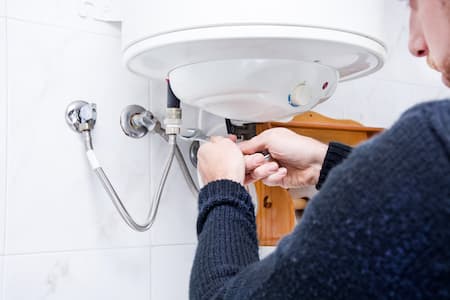The article author is making a number of great annotation relating to Common Problems with Tank Water Heaters in general in this content on the next paragraphs.

Think of starting your day without your routine hot shower. That currently sets an inadequate tone for the rest of your day.
Every home needs a trustworthy water heater, yet only a few recognize just how to manage one. One very easy method to keep your water heater in top form is to look for faults consistently as well as fix them as quickly as they appear.
Bear in mind to turn off your water heater before sniffing about for mistakes. These are the water heater faults you are most likely to come across.
Water too hot or as well chilly
Every hot water heater has a thermostat that establishes just how hot the water gets. If the water entering your home is also hot despite setting a convenient maximum temperature, your thermostat could be defective.
On the other hand, too cold water might be because of a stopped working thermostat, a damaged circuit, or incorrect gas flow. As an example, if you make use of a gas water heater with a busted pilot light, you would certainly get cold water, even if the thermostat remains in best condition. For electrical heaters, a blown fuse may be the offender.
Warm water
Regardless of how high you established the thermostat, you will not obtain any warm water out of a heating system well past its prime. A water heater's performance might reduce with time.
You will also obtain warm water if your pipes have a cross connection. This suggests that when you turn on a tap, hot water from the heating unit flows in alongside routine, cold water. A cross link is very easy to area. If your warm water faucets still run after shutting the hot water heater shutoffs, you have a cross link.
Unusual noises
There go to least five sort of noises you can hear from a hot water heater, however the most usual interpretation is that it's time for the water heater to retire.
To start with, you must recognize with the typical sounds a hot water heater makes. An electric heating system might seem different from a gas-powered one.
Standing out or banging sounds generally mean there is a slab of debris in your storage tanks, and it's time to clean it out. On the other hand, whistling or hissing audios may just be your shutoffs allowing some stress off.
Water leakages
Leakages could originate from pipelines, water connections, shutoffs, or in the worst-case situation, the storage tank itself. Over time, water will wear away the storage tank, and locate its escape. If this happens, you require to change your hot water heater immediately.
Nevertheless, before your modification your entire storage tank, make sure that all pipelines are in location which each valve functions flawlessly. If you still need help determining a leakage, call your plumber.
Rust-colored water
Rust-colored water suggests among your hot water heater elements is rusted. It could be the anode rod, or the tank itself. Your plumber will certainly have the ability to recognize which it is.
Not enough warm water
Hot water heater been available in many sizes, relying on your warm water demands. If you lack warm water before everyone has actually had a bathroom, your water heater is as well small for your family size. You must consider setting up a bigger water heater storage tank or opting for a tankless hot water heater, which takes up less space and also is a lot more resilient.
Discoloured Water
Rust is a major root cause of dirty or discoloured water. Deterioration within the water storage tank or a falling short anode rod could cause this discolouration. The anode rod secures the container from rusting on the inside and ought to be inspected yearly. Without a rod or an appropriately functioning anode rod, the warm water swiftly wears away inside the container. Contact a professional hot water heater professional to determine if changing the anode rod will deal with the trouble; otherwise, replace your hot water heater.
Verdict
Preferably, your hot water heater can last 10 years before you need a change. However, after the 10-year mark, you may experience any of these mistakes more frequently. At this point, you must add a brand-new hot water heater to your spending plan.
How To Troubleshoot 3 Common Water Heater Problems in Twin Cities
The Water Heater Is Leaking
- A leaky cold water inlet valve
- A loose pipe fitting
- A leaky temperature and pressure relief valve
- A corroded anode rod
- A cracked tank
Turn Off Your Water Heater:
- Shut off your gas water heater by turning the gas valve on the unit to the “OFF” position.
- Shut off your electric water by switching its power off at your electrical panel. Look for a two-pole breaker labeled “water heater” and turn it to the “OFF” position. Move the ball valve connected to the water heater to be perpendicular to the piping at a 90° angle.
Look for the Leak:
Depending on whether the water is coming from the tank's top or bottom, you’ll want to look for the leak in different locations.
If the leak comes from the top of the tank, carefully look for water escaping from the cold water inlet valve or loose pipe fittings. Rusted hot and cold water valves can have loose connections with the tank, with water leaking out of them.
https://mspplumbingheatingair.com/blog/how-to-troubleshoot-3-common-water-heater-problems
As a reader about Common Problems with Tank Water Heaters, I imagined sharing that excerpt was a great idea. Are you aware of another person who is interested in the subject? Why not promote it. Thank you for your time. Please check up our site back soon.
Fast and effective, call!
Comments on “Managing Heater Problems: A Step-By-Step Guide For The Handling Standard Issues”